Remedies for breach of contract - Attorney-General's Department
Remedies for breach of contract - Attorney-General's Department
Remedies for breach of contract - Attorney-General's Department
You also want an ePaper? Increase the reach of your titles
YUMPU automatically turns print PDFs into web optimized ePapers that Google loves.
INFOLET 10<br />
<strong>Remedies</strong> <strong>for</strong> <strong>breach</strong> <strong>of</strong> <strong>contract</strong><br />
Exploring the scope <strong>for</strong> re<strong>for</strong>ming Australian <strong>contract</strong> law<br />
Currently, courts are largely limited to awarding loss-based damages <strong>for</strong> <strong>breach</strong> <strong>of</strong> <strong>contract</strong>, although<br />
per<strong>for</strong>mance can be ordered in some circumstances. There are economic arguments in favour <strong>of</strong> this<br />
approach, but in some circumstances it may be inadequate. If the idea <strong>of</strong> re<strong>for</strong>ming Australian <strong>contract</strong><br />
law is welcomed, one re<strong>for</strong>m measure might be to expand the range <strong>of</strong> remedies that a court could<br />
order when a <strong>contract</strong> has been <strong>breach</strong>ed.<br />
What is a <strong>breach</strong>?<br />
A <strong>breach</strong> <strong>of</strong> <strong>contract</strong> occurs when a party fails to do what they have promised to do. This happens <strong>for</strong><br />
many different reasons. For example, a party may misunderstand their obligations, they may no longer<br />
have capacity to per<strong>for</strong>m, or they may no longer be willing to per<strong>for</strong>m.<br />
What is a remedy?<br />
A legal remedy is a court order that seeks to uphold a person’s rights or to redress a <strong>breach</strong> <strong>of</strong> the<br />
law. When one party <strong>breach</strong>es a <strong>contract</strong>, the other party may ask a court to provide a remedy <strong>for</strong> the<br />
<strong>breach</strong>. The court may order the <strong>breach</strong>ing party to pay money to the non-<strong>breach</strong>ing party.<br />
This remedy is called damages. Alternatively, the court may order the party to do what they promised<br />
to do under the <strong>contract</strong>. This remedy is called specific per<strong>for</strong>mance.<br />
Loss-based damages<br />
Damages are the normal remedy <strong>for</strong> <strong>breach</strong> <strong>of</strong> <strong>contract</strong>. In Australian law, the amount <strong>of</strong> damages is<br />
the loss caused by the other party’s <strong>breach</strong>. In most circumstances, the court will order the party in<br />
<strong>breach</strong> to pay the sum <strong>of</strong> money needed to place the non-<strong>breach</strong>ing party in the same situation as if<br />
the <strong>contract</strong> had been per<strong>for</strong>med.<br />
For example, if Abe promised to sell Beryl a car <strong>for</strong> $X, and then failed to deliver because he accepted<br />
a higher price from Celeste, a court may order Abe to pay Beryl the difference between $X and the<br />
market price <strong>of</strong> an identical car. This would allow Beryl to buy an identical car without paying more<br />
than $X.<br />
Market value is not always decisive when determining the amount <strong>of</strong> damages which a court may<br />
award <strong>for</strong> <strong>breach</strong> <strong>of</strong> <strong>contract</strong>. For example, if a builder constructs a house which does not con<strong>for</strong>m with<br />
the <strong>contract</strong>, the landowner is usually entitled to damages sufficient to pay <strong>for</strong> repairs or rebuilding<br />
to comply with the <strong>contract</strong> standards even if there is no difference in the value <strong>of</strong> the two houses.<br />
Damages calculated on the basis <strong>of</strong> market value would not put the innocent party in the same position<br />
(which means more than just the same financial position) as if the <strong>contract</strong> had been per<strong>for</strong>med.<br />
There is an economic argument in favour <strong>of</strong> limiting remedies <strong>for</strong> <strong>breach</strong> <strong>of</strong> <strong>contract</strong> to loss-based<br />
damages. This is because it allows a party to <strong>breach</strong> the <strong>contract</strong> where they can make a greater pr<strong>of</strong>it<br />
by doing so, as long as they pay compensation to the other party. One party is better <strong>of</strong>f and arguably<br />
the other party is no worse <strong>of</strong>f, leading to a net increase in wealth. This idea is known as an ‘efficient<br />
<strong>breach</strong>’. However, others argue that loss-based damages are <strong>of</strong>ten an inadequate remedy so that the<br />
non-<strong>breach</strong>ing party is not fully compensated.<br />
Remoteness<br />
Parties are entitled to loss-based damages only if the loss they have suffered has been caused by the<br />
other party’s <strong>breach</strong>. Additionally, if the loss could not have been expected, the loss may be too remote<br />
from the <strong>breach</strong> <strong>for</strong> damages to be awarded.
<strong>Remedies</strong> <strong>for</strong> <strong>breach</strong> <strong>of</strong> <strong>contract</strong> CONTINUED<br />
INFOLET INFOLET 10 8<br />
Exploring the scope <strong>for</strong> re<strong>for</strong>ming Australian <strong>contract</strong> law<br />
For example, if Arturo <strong>breach</strong>es his <strong>contract</strong> with Bea, Bea may have problems fulfilling a second<br />
<strong>contract</strong> with Caroline. If Bea makes a settlement with Caroline to avoid litigation, she may be able<br />
to recover the money she paid under the settlement from Arturo—but that depends on whether the<br />
decision to settle with Caroline, and the amount agreed on, was reasonable. Otherwise the loss may<br />
be too remote.<br />
Gain-based damages / Account <strong>of</strong> pr<strong>of</strong>its<br />
A party may make a pr<strong>of</strong>it as a result <strong>of</strong> <strong>breach</strong>ing a <strong>contract</strong>. Gain-based damages involve the court<br />
ordering the party in <strong>breach</strong> to pay the pr<strong>of</strong>its over to the non-<strong>breach</strong>ing party. Australian courts do not<br />
award gain-based damages <strong>for</strong> <strong>breach</strong> <strong>of</strong> <strong>contract</strong> because the fact that the party in <strong>breach</strong> has made a<br />
pr<strong>of</strong>it does not constitute a loss to the non-<strong>breach</strong>ing party. However, in England and the<br />
United States, cases have decided that gain-based damages can be awarded <strong>for</strong> <strong>breach</strong> <strong>of</strong> <strong>contract</strong> in<br />
some circumstances.<br />
Exemplary damages and penalty clauses<br />
Exemplary damages are damages which have deterrence value and are higher than the loss suffered<br />
by the non-<strong>breach</strong>ing party. Australian courts do not award exemplary damages <strong>for</strong> <strong>breach</strong> <strong>of</strong> <strong>contract</strong>.<br />
Nor will courts en<strong>for</strong>ce terms in the <strong>contract</strong> which set the amount <strong>of</strong> damages <strong>for</strong> <strong>breach</strong> if the sum<br />
goes beyond a genuine pre-estimate <strong>of</strong> loss. One justification <strong>for</strong> these rules is that they allow efficient<br />
<strong>breach</strong>es to take place. However, some argue that exemplary damages are sometimes appropriate.<br />
Certain <strong>breach</strong>es <strong>of</strong> <strong>contract</strong>, such as refusing to pay the other party after it has per<strong>for</strong>med its<br />
obligations, are in bad faith and do not lead to a more efficient use <strong>of</strong> resources.<br />
A greater role <strong>for</strong> specific per<strong>for</strong>mance?<br />
At common law, damages are the only remedy <strong>for</strong> <strong>breach</strong> <strong>of</strong> <strong>contract</strong>. However, in some cases courts<br />
may order specific per<strong>for</strong>mance <strong>of</strong> the <strong>contract</strong> to require the <strong>breach</strong>ing party to keep its promise.<br />
Specific per<strong>for</strong>mance is an exceptional remedy in Australian law. It will only be ordered when monetary<br />
compensation would be inadequate. It is most commonly used <strong>for</strong> the sale <strong>of</strong> land or <strong>of</strong> unique goods.<br />
There are a number <strong>of</strong> justifications <strong>for</strong> limiting the availability <strong>of</strong> specific per<strong>for</strong>mance as a remedy <strong>for</strong><br />
<strong>breach</strong> <strong>of</strong> <strong>contract</strong>. Specific per<strong>for</strong>mance may be costly to en<strong>for</strong>ce, as it requires prolonged supervision<br />
by the courts. Compelling parties to per<strong>for</strong>m <strong>contract</strong>ual obligations may be too great an imposition on<br />
individual liberty as well as being economically inefficient.<br />
The limited role <strong>of</strong> specific per<strong>for</strong>mance has been criticised. Specific per<strong>for</strong>mance arguably accords<br />
better with parties’ ordinary expectations when they make a <strong>contract</strong>. It allows them to get exactly what<br />
they <strong>contract</strong>ed <strong>for</strong>, not just monetary compensation. In some civil law jurisdictions and international<br />
<strong>contract</strong> law instruments, specific per<strong>for</strong>mance is the main remedy <strong>for</strong> <strong>breach</strong> <strong>of</strong> <strong>contract</strong>.<br />
Question <strong>for</strong> consideration<br />
Should the remedies available <strong>for</strong> <strong>breach</strong> <strong>of</strong> <strong>contract</strong> in Australian law be expanded? If so, how?<br />
As we consider the future direction <strong>of</strong> Australian <strong>contract</strong> law, we want to take account<br />
<strong>of</strong> everyone’s experience and perspective. If you want to respond to the infolets, please<br />
email us at <strong>contract</strong>law@ag.gov.au. You can also access our discussion paper on re<strong>for</strong>ming<br />
Australian <strong>contract</strong> law on the <strong>Attorney</strong>-General’s <strong>Department</strong>’s website at www.ag.gov.au/<br />
Consultationsre<strong>for</strong>msandreviews/Pages/Review-<strong>of</strong>-Australian-Contract-Law.aspx.<br />
Have<br />
your<br />
say<br />
DISCLAIMER: This infolet does not provide legal or other pr<strong>of</strong>essional advice, but contains general in<strong>for</strong>mation about issues related to Australian <strong>contract</strong> law. The Australian Government does<br />
not accept responsibility <strong>for</strong> the accuracy and completeness <strong>of</strong> the in<strong>for</strong>mation provided. Nor do the contents <strong>of</strong> this infolet commit the Australian Government to any particular course <strong>of</strong> action.


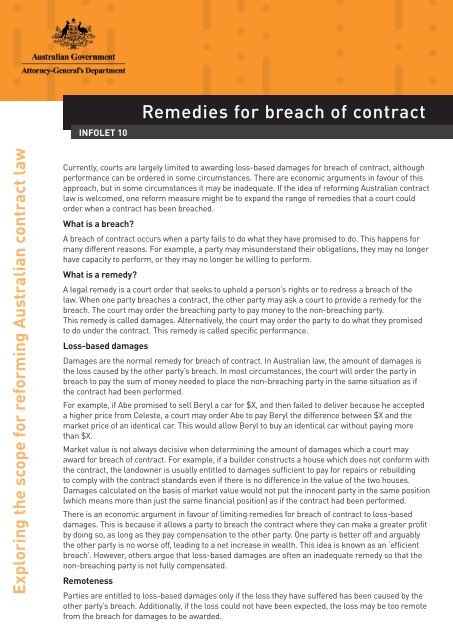

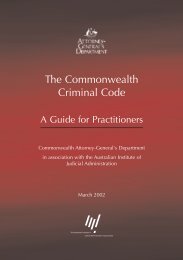
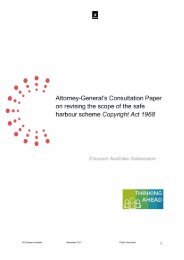

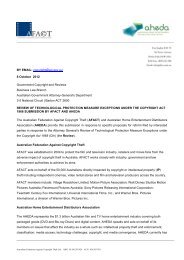






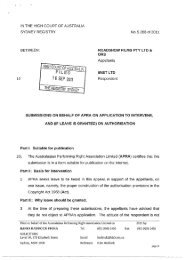

![Normann Witzleb [PDF 657KB] - Attorney-General's Department](https://img.yumpu.com/26247895/1/184x260/normann-witzleb-pdf-657kb-attorney-generals-department.jpg?quality=85)